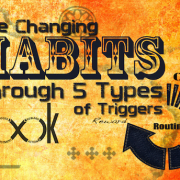5 Surefire Ways to Improve Your Personal Strengths
One of the things that I believe is necessary for people to perform at a high performance level on their life journey is to become aware of what they’re naturally good at in life. I’ve mentioned several books that you can learn about this with (StrengthFinders and Standout are my top two), but this really is the beginning of your journey.
The next step of leveling up in life is working on these strengths. In the video above, John mentions that you need to focus on your strengths and not on your weaknesses. However, he doesn’t exactly say how you can do that.
Here are some strategies that I’ve used in the past which will help you improve your personal strengths.
Gain Experience
When I was a kid, one of the coolest things to look forward to during the school year was when we would go on field trips. I think as a kid, you want to go because it’s a change of scenery from the regular class room. Also, the longer it took to get to the destination, so that meant more time you had on the bus to mess around.
Those days were awesome.
Looking back, though, I think those field trips had more lasting impressions on me on what I remembered than talking about the same thing in class. Was it because of the change of the routine? Sure. Perhaps that’s what started the the vivid memories, but being fully engaged in the environment I’m sure helped as well. Whether it was a trip to the Children’s Museum in Indy to study dinosaurs, or a trip to Metamora to learn about canals and to ride a train, those were the days that very particular memories have stuck with me.
Later in college I had lab segments for many of my courses. Professors said that these sections were for hands on learning. Well, I’ll tell you, I was horrible at many of the in class activities we had. (I was so horrible in lab that I came close to failing most practicals!)
However, thinking back now I realize that if it wasn’t for the lab section of many of my undergrad courses, that I wouldn’t have done as well in the rest of the course.
In both situations, I can think back now and realize how important those times were, even though (especially in the case of the lab sections) the material stretched me a little bit. Today, I compare many of the road trips I’ve been on with my past field trips. Likewise, when it comes to doing things that I’ve never done, I can think about the labs that I was in and think “Well, I know nothing can be that bad!”.
In the end, it’s that hard earned experience that will launch you further than if you just passively heard about it. It gives you confidence that you know what’s going to come up around the bend. Having dealt with similar situations before really helps you be confident in that you can handle whatever you’re doing with ease. And it also means that you can share something with others about how it went last time.
Get Feedback
Verification is key. Just ask any comedian.
Do you know why comedians are really funny when you just hear about them and then later they’re not as much? It’s because until the point where you’ve heard them, they’ve probably been working on that same joke routine for 5 to 15 years! From small audience to larger audience, to finally getting noticed by Comedy Central and then possibly on to sitcoms – they’re working on the same material.
After the Comedy Central Special has aired or the sitcom has run its course, what happens to these successful comedians? Many would say they go underground. It could be that, sure. Another thought is that they haven’t had time to get their new material as polished as their old stuff… or they just don’t feel the need to!
Similarly, when you’re doing an activity that utilizes your strengths, make sure you’re asking for feedback. For one, it makes you better at your strengths. And two, it might just keep you relevant to your potential audience!
Keep a Journal (Write Stuff Down)
Ok, so as you might be aware, I recently started writing down weekly plans. This has been game changing and I’ve only been doing it for a couple of weeks now. I now know why teachers have to lesson plan. It’s amazing the difference of work you can get done when you plan out when you’re going to work and get stuff down.
On top of this, I’m also keeping ideas down as part of my daily journaling. Journaling is just as important as the weekly planning because it’s really easy to later examine what you’ve already done.
Writing things down is also important because it just stares back at you. It doesn’t change. You can keep coming back to it and adding. Obviously, the opposite of that, simply speaking things and trying to remember them… is not so functional. It’s real easy to go from one idea to the next. Never really planning anything out.
Just get things recorded and you’ll later be able to act on them or make them better. (In fact, a recommendation that Pat has is using sticky notes if you’re looking to brainstorm. He does this for books.)
Participate in a Mastermind (or another type of study group)
Think tanks, masterminds, roundtables, or simply small groups – whatever you call them – can be huge. Not only do you get the benefit of immediate feedback, but you also have the benefit of multiple people contributing to making each other better. Throwing an idea out and reflecting upon it with a group is obviously going to have much better results than you just working on it yourself or with one other individual.
Follow in the Footsteps of Others
One of the sayings that I’ve heard over and over about being mentored and/or coached on a strength is that particular mentor or coach has probably seen it before. So the question is, “Do you want to find the land mines yourself or would you like to know where they are and get through the path faster?”
Personally, I’d like to know where the potential problems are going to be and learn from others about them.
To do this, you can either personally interact with someone 1on1 (probably expensive) or you can spend time reading books and online resources that they have produced. Either way, just one hour a day spent towards using these resources will help you grow a great deal. Depending on the topic, after a month or so, the results of study and fine tuning start compounding and you’ll notice a great difference.
Homework
Ever since I started on my self development path back in 2006, I’ve believed that we should focus on growing our strengths, and get help on our weaknesses. Once you figure out what your strengths are (again, I’m a Connector and a Teacher according to Standout), work on gaining experience doing those strengths, getting feedback, keeping a journal, participating in groups, and studying great resources. You’ll find that your efforts in these areas will pay great dividends in your personal growth.
If you have already started developing your strengths, I’d love to hear how you did it. Was it one of the ways above or something completely different?









